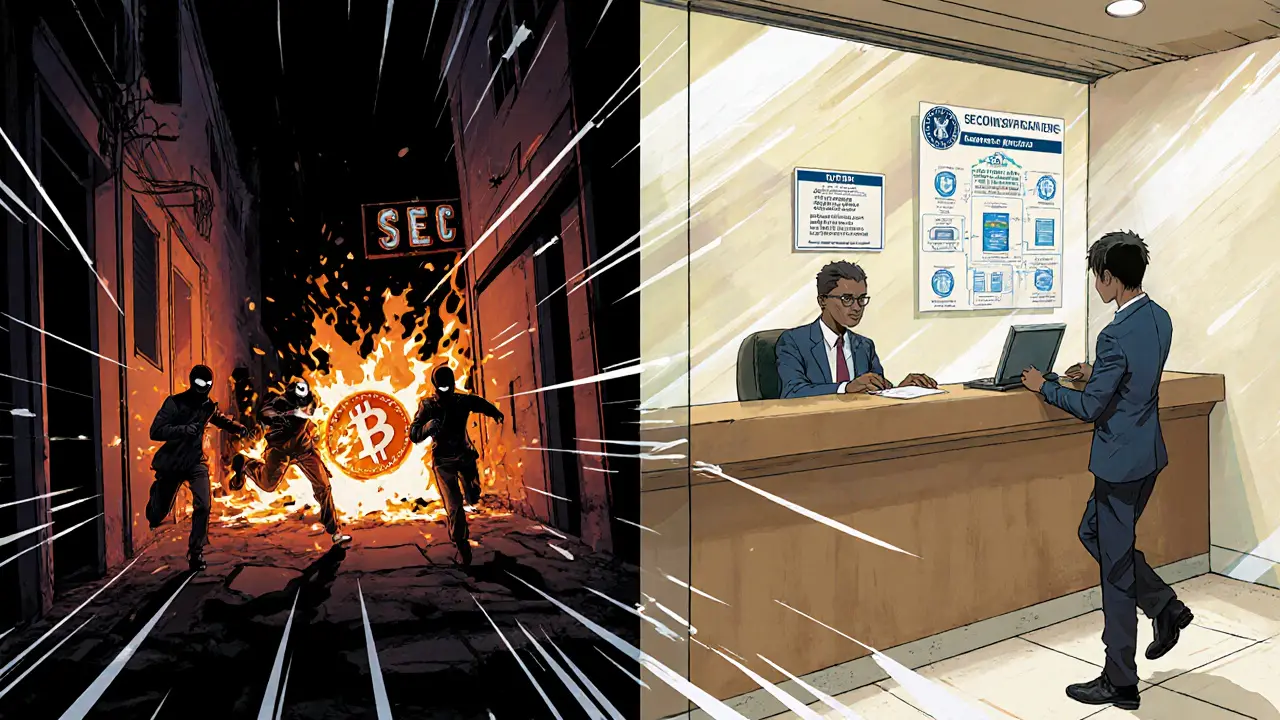SEC Nigeria VASP License Checker
Verify SEC License Status
Check if a crypto platform is currently licensed by SEC Nigeria before onboarding as a client. This tool helps financial institutions comply with new regulations.
Before March 2025, Nigerian banks couldn’t touch cryptocurrency businesses. Not even to open an account. Now, they’re required to. That’s the kind of flip Nigeria’s financial regulators pulled with the Investment and Securities Act (ISA) 2025. Signed into law by President Bola Ahmed Tinubu on March 31, 2025, this isn’t just a tweak-it’s a complete overhaul of how crypto operates in Nigeria. And for financial institutions, it means one thing: if you’re doing business with crypto, you’re now under the direct watch of the Securities and Exchange Commission (SEC) Nigeria.
What the SEC Nigeria Actually Controls Now
The ISA 2025 didn’t just make crypto legal-it made it a security. That means any digital asset sold as an investment, whether it’s a token, coin, or NFT tied to a profit promise, now falls under the same rules as stocks and bonds. The SEC Nigeria doesn’t just have a say anymore-it has full authority to license, monitor, fine, and shut down anyone running a crypto exchange or virtual asset service provider (VASP) without permission. This isn’t about banning crypto. It’s about bringing it into the light. Before, crypto platforms operated in a legal gray zone. Many were Ponzi schemes disguised as investment apps. Now, the SEC can go after them with real legal teeth. Operators of fraudulent schemes face stiffer penalties, including criminal charges. And if you’re running a crypto platform without a license? You’re breaking the law.Who Needs a License from SEC Nigeria?
If your business does any of these, you need a license:- Operating a crypto exchange (buying, selling, or trading digital assets)
- Providing custody services for crypto wallets
- Offering crypto-based investment products
- Running a platform that matches buyers and sellers of crypto (peer-to-peer facilitation)
How Banks Fit Into the New Rules
In 2021, the Central Bank of Nigeria (CBN) told banks: “Don’t touch crypto.” That caused chaos. Legitimate businesses couldn’t pay employees or settle transactions. Many turned to informal channels or offshore banks. That changed in 2023. The CBN reversed course. Now, banks are not just allowed-they’re expected-to provide banking services to SEC-licensed VASPs. This is huge. It means crypto companies can now open corporate bank accounts, process Naira payments, and integrate with Nigeria’s formal financial system. But here’s the catch: banks aren’t free to pick and choose. They must verify that the VASP has a valid SEC license. If they bank an unlicensed platform, the bank itself can be penalized. So, Nigerian banks now have a new compliance job: checking SEC’s public registry of licensed VASPs before onboarding any crypto client.
The Other Regulators You Can’t Ignore
The SEC isn’t working alone. Three other agencies are part of the puzzle:- Central Bank of Nigeria (CBN): Still sets monetary policy. They ensure crypto doesn’t destabilize the naira or trigger capital flight.
- Nigerian Financial Intelligence Unit (NFIU): Monitors for money laundering and terrorist financing. Every crypto transaction over ₦500,000 must be reported.
- Nigeria Tax Administration (NTAA) 2025: Starting January 2026, VASPs must collect and remit taxes on crypto gains. Failure means fines: ₦10 million ($6,693) for the first month, then ₦1 million ($669) every month after that.
What Happens If You Don’t Comply?
The penalties aren’t warnings-they’re business killers.- Unlicensed VASPs: SEC can shut them down immediately. Their websites get blocked. Their domain names seized.
- Non-compliant banks: Can lose their operating license from the CBN. Fines up to ₦500 million ($334,000) for repeated violations.
- Tax evasion: NTAA 2025 allows the Federal Inland Revenue Service (FIRS) to freeze assets and pursue criminal charges against VASPs that don’t file.

Market Reality: Nigeria Is Still the Crypto Giant
Despite all the rules, Nigerians are still buying crypto faster than almost anyone else on Earth. Between July 2024 and June 2025, Nigeria saw $92.1 billion in crypto transactions-more than double South Africa’s volume. It’s the #1 country in the world for peer-to-peer crypto trading. Why? Because the naira is unstable. Inflation is high. Young people are looking for ways to save, earn, and send money across borders without relying on slow, expensive banks. Crypto isn’t a trend-it’s a necessity for millions. The SEC knows this. That’s why the ISA 2025 isn’t about stopping adoption. It’s about controlling it. The goal is to protect users, stop fraud, and bring crypto into the formal economy. And so far, it’s working. Licensed exchanges report a 40% drop in fraud cases since licensing began.What’s Next for Financial Institutions?
If you’re a bank, fintech, or payment processor in Nigeria, here’s your action list:- Check the SEC’s official VASP registry daily. It’s public and updated weekly.
- Train your compliance team on crypto-specific AML rules. The NFIU released new guidelines in May 2025.
- Set up automated transaction monitoring for crypto-related deposits and withdrawals.
- Don’t onboard any crypto business without proof of SEC licensing.
- Prepare for tax reporting under NTAA 2025. Start collecting user data now-even if the law starts in 2026.
How Many Nigerians Are Using Crypto?
By 2026, an estimated 28.69 million Nigerians-about 13% of the population-will own or regularly use cryptocurrency. That’s more than the entire population of New Zealand. And it’s growing fast. Most users are under 35. Many use crypto to send remittances, buy foreign goods, or invest in global assets. They don’t care about regulation. They care about access. The SEC’s job is to make sure that access doesn’t come at the cost of safety. The message is clear: crypto isn’t going away. But it’s no longer the wild west. It’s a regulated market. And if you’re a financial institution in Nigeria, you either get onboard-or get left behind.Can Nigerian banks still refuse to bank crypto companies?
No, not if the crypto company is licensed by the SEC Nigeria. Since 2023, the Central Bank of Nigeria has mandated banks to provide services to SEC-licensed VASPs. Refusing to do so without valid reason can lead to regulatory penalties against the bank itself.
Is Bitcoin legal in Nigeria?
Yes, Bitcoin and other cryptocurrencies are legal to own and trade in Nigeria-but not as legal tender. You can’t use Bitcoin to pay for government services or taxes. But you can buy, sell, and hold it. The SEC regulates it as a security, not as money.
Do I need to pay taxes on my crypto profits in Nigeria?
Yes, starting January 1, 2026, under the Nigeria Tax Administration Act (NTAA) 2025, all crypto gains are taxable. VASPs must collect and report user transaction data to the Federal Inland Revenue Service. Individuals must declare crypto profits on their annual tax returns. Failure to do so triggers fines of ₦1 million per month after the first default.
How do I check if a crypto platform is licensed by SEC Nigeria?
Visit the official SEC Nigeria website and navigate to the ‘Licensed Virtual Asset Service Providers’ section. The list is updated weekly and includes company names, license numbers, and registration dates. Always verify before using any platform.
What happens if a crypto exchange gets shut down by SEC Nigeria?
If a platform loses its license or is found operating illegally, the SEC can immediately freeze its operations, block its website, and seize its domain. User funds held on the platform may be inaccessible until a court-appointed administrator takes over. There’s no guarantee of full recovery-this is why using licensed platforms is critical.







Gavin Jones
November 14, 2025 AT 21:03Wow, this is actually a massive step forward for Nigeria’s fintech scene. I never thought I’d see a country with such high crypto adoption officially bring it under regulation without trying to crush it. Kudos to SEC Nigeria for recognizing that you can’t fight reality-you gotta shape it. This could be a blueprint for other emerging markets.
Mauricio Picirillo
November 15, 2025 AT 09:13Finally someone gets it. Crypto isn’t going away, and pretending it is just pushes it underground. This is smart. Banks finally have clear rules, users get protection, and the shady ops get kicked out. Nigeria’s leading the charge-hope other countries pay attention.
Liz Watson
November 16, 2025 AT 13:53Oh wow, the SEC is now the crypto police? How quaint. Next they’ll be issuing compliance brochures with cute little Naira emojis. Honestly, regulating crypto like it’s a stock exchange is like putting a tuxedo on a raccoon-it’s still gonna trash your garbage.
Rachel Anderson
November 18, 2025 AT 06:57I’m literally crying. After years of seeing my cousins lose everything to ‘crypto gurus’ on Telegram, now there’s a chance they’ll be safe. This isn’t just policy-it’s salvation. The SEC didn’t just make rules, they gave hope to millions who’ve been burned. Thank you, Nigeria. You’re doing something beautiful.
Hamish Britton
November 20, 2025 AT 04:29Just a heads-up-banks are gonna struggle with this. They’ve got zero crypto experience, and now they’re expected to audit tokenomics? Most compliance officers still think ‘DeFi’ is a type of pasta. This’ll be messy for a while. But yeah, it’s the right direction.
Robert Astel
November 20, 2025 AT 17:22So… if crypto is a security now… does that mean Bitcoin is essentially a bond? Like… if I hold BTC, am I holding a promise of future value? And if so… who’s making that promise? The network? Satoshi? God? Is this the first time a decentralized system has been legally classified as a centralized obligation? I mean… isn’t that a contradiction? Like… if it’s trustless, why are we putting it under the same legal umbrella as Enron? I’m just asking… for science.
Andrew Parker
November 22, 2025 AT 07:27This is the most beautiful thing I’ve seen all year 😭💔 I’ve been waiting for this since 2017… when I lost my life savings to a fake ICO… and now… now they’re finally holding the bad guys accountable… I can breathe again… 🤍
Katherine Wagner
November 22, 2025 AT 14:03Regulation? Or control? The SEC says it’s about safety… but they’re also making it harder for small players to compete. And why does every regulation need 5 agencies involved? CBN, NFIU, NTAA, FIRS, SEC… who’s in charge? Someone’s gonna drop the ball. And when they do, who pays? The user. Always the user.
ratheesh chandran
November 22, 2025 AT 14:22So many people in India think Nigeria is just a mess… but look at this… they’re actually thinking ahead… we in India still have crypto bans and police raids… while Nigeria is building a system… this is leadership… i am proud of nigeria… 🇳🇬
Hannah Kleyn
November 23, 2025 AT 00:20I’ve been watching this play out since 2021. The CBN ban was brutal-people were using VPNs to access exchanges, paying premiums on P2P, and still sending money abroad because the naira kept tanking. Now the SEC is saying: ‘Fine, you want crypto? Here’s how you do it safely.’ It’s not perfect, but it’s honest. And honestly? That’s more than most governments offer. The real win is that young Nigerians won’t have to choose between survival and legality anymore.
gary buena
November 23, 2025 AT 05:24Let’s be real-this is just the government trying to tax the one thing that’s actually working for ordinary people. Crypto’s not a security, it’s a workaround. And now they want a cut? Cool. I’ll just keep using Binance P2P and ignore the ‘licensed’ platforms. At least my money’s still mine.
Albert Melkonian
November 24, 2025 AT 11:17This regulatory framework represents a rare convergence of pragmatism and foresight. The integration of multiple agencies-SEC, CBN, NFIU, and NTAA-creates a comprehensive, layered oversight structure that balances innovation with systemic integrity. Financial institutions must now treat crypto compliance not as a peripheral concern, but as a core operational pillar. The precedent set here could redefine emerging-market fintech regulation globally. A model worth emulating.
Kelly McSwiggan
November 25, 2025 AT 19:50Oh great. More paperwork. More audits. More ‘compliance officers’ who don’t know what a smart contract is. This isn’t regulation-it’s bureaucratic theater. The real fraudsters are already offshore. The ones getting crushed? The small devs and micro-businesses trying to build something real. Congrats, SEC. You’ve turned a grassroots revolution into a tax audit.